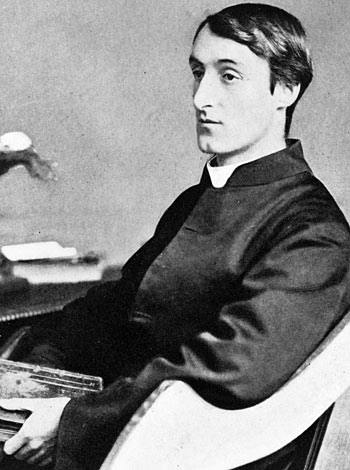 Thomas Merton not only enjoyed
the poetry of Gerard Manley Hopkins, a poet from the mid-nineteenth century,
but also held a number of similarities to the man. Hopkins, like Merton, converted to
Catholicism during his time in college and focused his efforts primarily on
writing. He utilized complicated rhythms
within his poetry and focused upon the beauty found in nature.
Thomas Merton not only enjoyed
the poetry of Gerard Manley Hopkins, a poet from the mid-nineteenth century,
but also held a number of similarities to the man. Hopkins, like Merton, converted to
Catholicism during his time in college and focused his efforts primarily on
writing. He utilized complicated rhythms
within his poetry and focused upon the beauty found in nature.
Merton was first introduced to
his poetry through his Headmaster.
Though he had never heard of the man up until this point, Merton
recalled how his poetry “was original and had a lot of vitality and music and
depth.”[1] Years later he found himself picking up more
of Hopkins writing, absorbed not only in his verse but also in his life as a
Jesuit, which prompted questions of what priests’ lives consisted of. This writing sparked an interest in the faith
and Merton was actually “reading a biography of Hopkins when he made the
decision to become a Catholic.”[2] The similarities found between their lives
actually prompted Merton’s conversion.
As he read more and more of
Hopkins, his appreciation for the man prompted his own attempts at writing
verse and his intention to “write a Ph.D. dissertation on Hopkins” while living
in New York.[3] Merton was influenced not only by his writing
but also by his life as a devout man of faith.
Gerard Manley Hopkins struggled
with the effects writing could have on his faith. He was “concerned that his poetry was
preventing him from concentrating fully on his faith,” and therefore “burned
his poems and stopped writing poetry entirely for seven years.”[4] It was not until he was asked to write a poem
by his superior that he picked his pen back up to commemorate those who died
for their faith. Similarly, when Merton
“first entered the monastery he expected he would not be allowed to write.”[5] He did not think it was a viable option for
someone called to be a contemplative.
However, his superiors
recognized this gift within him and ordered him to write. Merton was able to “see his writing as a help
to his contemplation instead of its rival.”[6] He found strength through it, which empowered
his readers as well. Hopkins’ poetry
“captures the beauty of ordinary things and helps us to see them in a new way,
a way that gives glory both to God and to creation.”[7] Both Hopkins and Merton were willing to give
up their love of writing for the sake of the gospel, but they were rewarded by
their faithfulness and utilized these gifts for the empowerment of the kingdom.

No comments:
Post a Comment